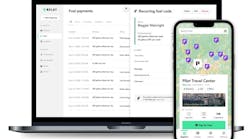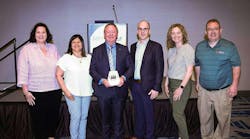It's not hard to find reasons to single out Knight Transportation for plaudits. It happens all the time — the company has been named one of “200 Best Small Companies” by Forbes for eight consecutive years and Worth magazine has ranked its chief executive, Kevin Knight, as one of the 50 best CEOs in America.
What makes Knight both a performer on Wall Street and a standout among its industry peers is a solid business model and, just as importantly, an unwavering commitment to stick with it. Even when roiled by the latest trucking turmoil.
The case in point is how the company responded to the advent of '02-compliant engines. Unlike many of its truckload competitors and other for-hire fleets, Knight refused to declare the sky was falling and boldly — but not foolishly — stuck with its existing equipment suppliers and vehicle trade cycles.
In August '02 Knight announced it would not be pre-buying or trade-cycle stretching as many for-hire fleets had declared they would to avoid the new engines altogether.
Quite the contrary. It entered into a long-term but non-exclusive agreement to purchase new Volvo VNL670 tractors powered by '02-compliant Cummins and Volvo engines.
“This agreement allows us to continue our long-standing relationship with Volvo, a company which has produced a tractor that is proven to be safe, cost-effective and preferred among our drivers and mechanics,” stated CEO Kevin Knight at the time.
According to Knight, the deal ensured access to new tractors under favorable terms over several years while retaining the ability to talk with other OEMs.
“We were the only truckload fleet that moved forward with the new engine technology,” Knight recalls. “Everyone told us we were crazy.”
Throughout this year, Knight stuck with that plan. And it rained a bit but the sky did not fall.
He reports Knight has incurred “some loss of fuel economy plus the added [per-unit] cost” of the new engines.
“But we deepened our relationships with Cummins and Volvo — and remained focused on our equipment plans for the next few years,” Knight states.
Also on the upside, he points out that dealing with the '02 engines head-on has put the carrier “in a better position for [dealing with] the next emissions go-round” in '07.
STILL UP
What Knight says he is very proud of as 2003 winds down is that “from 1999 to 2002 right into 2003, we have continued to grow our business consistently — with revenues as well as earnings going up.
“That is a real testament to our decentralized operating model,” he adds, “and to our people in the field who have the responsibility on their shoulders to make us succeed.”
Impressive numbers underscore the success Knight Transportation's innovative approach delivers.
The company was formed in 1990. Its first year out it produced over $13 million in revenue. It went public in 1994 and by 1999 was generating over $150 million in revenue. It now fields a fleet of over 2,100 tractors and 5,400 trailers, as well as a corps of trained drivers.
On top of those impressive stats, all the while it has continued to maintain an operating ratio in the low 80s — which Knight says results from “a business made of experience, planning and discipline.”


